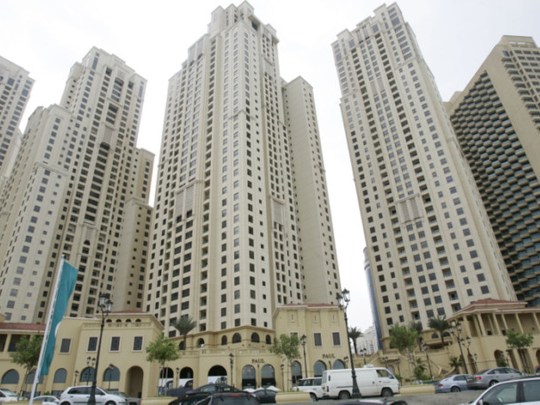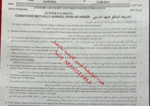
Dubai: A landlord in the Arabian Ranches is at his wits’ end. His villa with a pool has a tenant who moved in last year for an annual rent of Dh255,000. When the contract was due for renewal this May, the landlord wanted to bring the rent on par with the market rate of Dh290,000.
But the tenant wanted a compromise settlement at Dh270,000. Unaware of the rental laws of Dubai, the landlord who lives overseas asked the tenant to immediately vacate. The tenant promptly filed a complaint with the Dubai Rent Dispute Settlement Centre. The result: the tenant remains in the property and the landlord is making do with the original rent. The dismayed homeowner has now given the tenant a 12-month notice to vacate and put up his villa for sale.
Another landlord with a three-bedroom apartment in Dubai Marina is in a similar predicament after he rented out his property at Dh135,000 three years ago. He is peeved that the same apartment can fetch him Dh200,000 if he were to get a new tenant today. But he cannot evict the earlier tenant nor raise the rent beyond 15 per cent, the maximum he will be allowed by the rental increase calculator.
While disgruntled landlords find few sympathisers amidst the more pressing worries of tenants over rising rents in Dubai, the growing number of expat property owners has suddenly catapulted their concerns to the fore. According to the Dubai Land Department, foreign investors were behind nearly half of all real estate deals in Dubai last year, accounting for Dh114 billion of the Dh236 billion investment. The foreign nationals belonged to 162 countries, with Indians, Britons and Pakistanis topping the list.
Landlords said the steep rise in rentals over the last few months has put many of them who let out their properties at relatively lower rates three-four years ago at a huge disadvantage as the rent cap and other rules on eviction constrain them from making changes.
“I have no problem with the rent cap being in place. But what I find unfair is that there are no price restrictions on landlords who get new tenants on board in the open market,” said a landlord in Jumeirah Lake Towers, who has been stuck with a rent of Dh90,000 for a two-bedroom apartment for the last three years following a rent dispute.
Realty experts, however, put it down to market dynamics. Mohanad Alwadiya, managing director of Harbor Real Estate, said: “The new market is open and prices are driven by the dynamics of demand and supply. Since the last quarter of 2013, rental prices have increased by 20-30 per cent because of the demand. Many landlords who let out their properties earlier are realising the potential for higher rents, so that’s why we hear them complaining. But what they must understand is that a property is like a commodity and prices come down only when the supply exceeds demand.”
Helen Tatham, managing partner of Prime Places, said: “I don’t think any landlord would rent his property out for less than the market rate unless there is an undeniable oversupply of similar units.”
There are instances where landlords who have bought their properties on mortgage rent them out in a hurry by compromising on the rates sometimes just to be able to repay their loans.
Lack of awareness about the local law, however, could cost them dear.
Alwadiya said the rent cap law of 2013 entails a layered structure setting out the maximum percentage increase in rent permitted when a lease is renewed. The law allows up to a 20 per cent rent increase depending on the variance between the property rental value and the average market rental rate for properties in the area. Nothing stops a landlord from effecting the 20 per cent increase while renewing a lease if the existing rent is more than 40 per cent below the average market rental rate.
Having said that, however, there could still be a gap. Citing an example, a homeowner said a 20 per cent rent increase for a two-bedroom apartment leased out for Dh70,000 in the Greens in 2009 would come up to Dh103,000 during renewal, way below the Dh150,000 that it would fetch in the open market.
Tatham said: “Some landlords have kept the same tenant since the more depressed years and are now in a position that they can do little about matching the going market rental rate for their property.”
Putting things in a historical perspective, she said: “Some Dubai landlords find they are in an unfavourable position today as opposed to Abu Dhabi where the rent cap was lifted earlier this year. The Dubai Government in 2007 imposed restrictions for landlords to control the rising cost of living during the boom years. The first was to disallow any rise in rents within the first two years of tenancy, followed by a standard five per cent rental cap. The market changed dramatically between 2009 and 2011 and with sales prices dropping sharply, there was a natural fall in rental prices. Tenants seized the opportunity to either negotiate a lower rent with their landlord or move to a similar property and pay less. Rents were flat for a couple of years and those who had no desire to buy stayed in their rented home.”
She said with an upturn in sales prices in popular communities by mid-2012, the desirability to live in those areas grew. “For any new residents or those that had to move, the cost of being a tenant rose again. The introduction of the Rental Increase Calculator in 2013 ensured landlords couldn’t increase their tenant’s rent year-on-year.”
The other issue concerns eviction. Landlords claim it is not always easy to get their properties vacated.
A realty broker said: “There are many reasons why landlords may want eviction – they may want to get a new tenant at a higher rental or sell the apartment. A vacant apartment is always easier to sell. But the law is stringent on eviction and real estate companies should educate landlords about the rules.”
He said the law requires that to evict a tenant, a landlord must provide a 12-month notice. The grounds on which he can evict are also clearly defined. He should be able to show that he is either rebuilding the property or that he needs it for himself or a direct (first degree) family member to move into. He must be able to prove he has no other property he can use for that purpose.
In addition, Tatham said a landlord caught re-renting his property within two years after serving a notice is liable to pay a fine equivalent to the value of six months’ rent.
So what is the way out?
Alwadiya said there is no substitute for good homework. “People buying properties here should do their research and understand the law. Often, lack of awareness and poor advice lands them in a spot. Also, having a stable and trustworthy tenant is important, even if it means a lower rent sometimes.”
Tatham said: “On the basis that the landlord does not want to sell or occupy, he will either abide by the RIC if he wants to retain ownership of the property for a while longer or if he has a good relationship with his tenant, he may be able to negotiate reasonable terms for them to move out or stay with an agreeable increase between the parties. Ultimately, the lease agreement is private between them and they can do what they want. It is only if there is a dispute that it will be referred to the Dubai Rent Dispute Settlement Centre.”
You speak:
What has been your experience with a difficult landlord or tenant?
Write to us at:
editor@xpress4me.com
www.xpress4me.com
sms 5101












